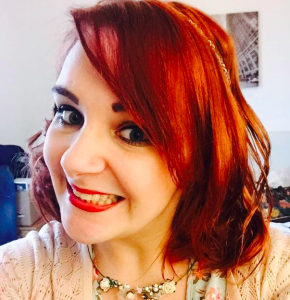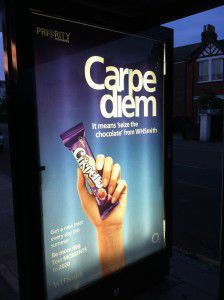Are you ever too old to learn a language?
As a small child, I was practically a real-life Harry Potter. Without the magic. Or the mean Aunt and Uncle. Okay, well really, the only similarity is that I spent a lot of my days in the cupboard under the stairs. Now, before you call the authorities, don’t worry. It was my favourite place! I had a comfy chair and my own TV and all the VHS tapes of awful 90s cartoons that a toddler could ever ask for!
 Why is this relevant to EuroTalk I hear you ask?! Well, it was here, sat watching Tots TV, that I accidentally taught myself French! My parents had no idea, until one day I casually said to my Mum ‘Bonjour, Je m’appelle Codie! That means “Hello, my name is Codie”, Mummy!’. She was in shock. After all, what would you think if your three year old daughter started spouting French? Once I’d explained that I got it from Tilly (sorry to anyone born too early/late to understand the references here, YouTube it!), I was inundated with French books, tapes and excited relatives. Even the nurse at our local GP practice heard about my weird knowledge and insisted on making me count to ten in French whilst she gave me my injections. I was essentially a performing monkey – but I loved it!
Why is this relevant to EuroTalk I hear you ask?! Well, it was here, sat watching Tots TV, that I accidentally taught myself French! My parents had no idea, until one day I casually said to my Mum ‘Bonjour, Je m’appelle Codie! That means “Hello, my name is Codie”, Mummy!’. She was in shock. After all, what would you think if your three year old daughter started spouting French? Once I’d explained that I got it from Tilly (sorry to anyone born too early/late to understand the references here, YouTube it!), I was inundated with French books, tapes and excited relatives. Even the nurse at our local GP practice heard about my weird knowledge and insisted on making me count to ten in French whilst she gave me my injections. I was essentially a performing monkey – but I loved it!
Fast-forward a few years later and I’m in the second half of Primary School. We have a super cool substitute teacher who plays guitar and teaches us German. It takes him less than half an hour to teach an entire class of children to count to ten in German and 15 or so years later I still know it.
Fast-forward a few years even later and my adorable four year old nephew is counting to ten in Japanese! Something they learn at pre-school through the use of cute mnemonic devices (with even cuter actions!). Languages are being taught younger and younger and suddenly, my toddler French seems a whole lot less impressive.
 So that leads me to wonder, am I too old to learn a language? I’m led to believe that the older you are, the harder it is to learn an instrument (well, at least I can sort of play the recorder, right?), so does this apply for other skills? I can’t do a cartwheel, so I figure that boat has sailed, but I did recently learn how to knit… badly. Do different things have different cut off points? As knitting is usually for old ladies, was I only able to learn it because I’m cracking on a bit now? (Maybe a slight exaggeration, I am only 23 after all.) Most importantly am I the right age to finally start learning a language? As I’m currently childless, I know it’s my biological clock I should be worried about, but I genuinely think it is being drowned out by the voice in my head that is yelling ‘What happened to the girl who was learning French before she could tie her shoes? What are you doing with your life?!’.
So that leads me to wonder, am I too old to learn a language? I’m led to believe that the older you are, the harder it is to learn an instrument (well, at least I can sort of play the recorder, right?), so does this apply for other skills? I can’t do a cartwheel, so I figure that boat has sailed, but I did recently learn how to knit… badly. Do different things have different cut off points? As knitting is usually for old ladies, was I only able to learn it because I’m cracking on a bit now? (Maybe a slight exaggeration, I am only 23 after all.) Most importantly am I the right age to finally start learning a language? As I’m currently childless, I know it’s my biological clock I should be worried about, but I genuinely think it is being drowned out by the voice in my head that is yelling ‘What happened to the girl who was learning French before she could tie her shoes? What are you doing with your life?!’.
And that, my friends, is the existential crisis that has inspired me to try and learn Japanese, with the help of EuroTalk. Maybe I’ll shut myself in the cupboard under the stairs for old times’ sake!
Codiekinz is a twenty-something blogger from the South, currently masquerading as a Northerner. She makes YouTube videos and posts about life, books, travel and her bearded dragon, over at www.codiekinz.co.uk. She’ll also be using uTalk to learn Japanese, so keep an eye on her blog for updates!
You can also follow her on Twitter @CodieKinz
Photo credit: codiekinz.co.uk
Time to say ‘Dyw genes’ to Poldark
I don’t know about you, but here at EuroTalk we’ve been very much enjoying the BBC’s latest Sunday night drama, Poldark. Set in the late 18th century, and based on the books by Winston Graham, it’s the story of Ross Poldark (Aidan Turner), who returns from the American War of Independence to find his father dead and the woman he loves engaged to his cousin. Poldark is an epic love story, with a suitably dashing hero, but it’s also a historical drama about the business and politics of the mining industry in south west England. I can’t speak for its accuracy, but it’s definitely very enjoyable…
Poldark is set on the beautiful coast of Cornwall, and with the series finale airing this weekend, we thought it was only right that we say an appropriate farewell. So whether you’ve always fancied learning a little Cornish, or, like us, you’re a fan of the lovely Ross, here’s your chance.
How did you do?
Want an opportunity to try out what you’ve learnt? Read Nat’s post on 10 reasons to visit Cornwall.
And if you haven’t had a chance to enjoy Poldark, and you’re wondering what all the fuss is about, check out the trailer.
3 great TV shows for learning Spanish
After two years of barely pulling an ‘A’ in my Spanish class, I decided to start studying more. I had a really bad problem when it came to listening to Spanish. Mostly because I couldn’t understand the language. So over the summer I watched a couple of Spanish TV shows, and found them very interesting and extremely beneficial when it came to understanding the language. Being able to watch a TV show in a foreign language is a great feeling, so I urge people to learn the vocabulary. Following this list means that you can start enjoying this amazing gift.
As a forenote, I learned Spanish so I am using Spanish examples; however I will add my favorite genres for learning, in order of importance. If you would like to find a language, Google search ‘watch television shows free’ or ‘popular television shows in X’. This has to be done in the target language of course. Now without further ado…
1. ¿Dónde está Elisa? (or just Dramas)
Dramas. The characters use a TON of expressive body language. This is my best choice when it comes to learning how to hear a language. You won’t sit there completely bored as you practise, and also because it’s a television series, people are always talking and you can use previous context.
2. La Fuga (Action series)
Technically, this show isn’t an action series. It’s another drama, but it’s set in the future of a prison. People die and there’s fighting in it, so I think it should be action. Anyways, once you can start to understand what’s happening in your drama series, then I recommend exploring different dramas. For me it was action, because I love thrillers and suspense.
The main benefit of switching genres is your entertainment. There are so many different genres, it shouldn’t be hard to find something that you like. You’ll have fun watching it, learn a couple of phrases, and become one step closer to having conversations with natives.
3. Aquí no hay quien viva (Comedies)
Comedies should absolutely be saved for last on your list of genres to watch. The body language can be deceiving and it is very difficult to understand what is happening. On the up side, once you understand words, it can be very pleasing to watch. I love Aquí no hay because a ton of episodes are free on YouTube, and also it makes me laugh. It reminds me of watching Seinfeld, but it’s in Spanish.
—
This is the order I used to increase my language abilities. I highly recommend that you watch TV in your target language at some point. It’s a great accomplishment to understand what they are saying; however I should warn you because watching too much television can hinder your progress. Speaking is ultimately the best practice, but it is good to take a break and watch some television from time to time.
Do you watch TV as part of your language learning? Please share your recommendations in the comments.
Ray Jones
Read more from Ray on his blog at themodernlingo.com.
—
Want to join the EuroTalk blogging team? We’re always keen to hear from language enthusiasts with something to share. Email liz@eurotalk.com for details.
The true meaning of character names from fiction
The other day, I was watching one of my favourite films, The Lion King (yes, I know it’s a kids’ film but I love it) and I was reminded of a fun fact I read recently, that many of the characters’ names are taken from Swahili. Simba means ‘lion’, Rafiki means ‘friend’, ‘Nala’ means ‘gift’ and Pumbaa means ‘simpleton’. Poor Pumbaa.
So often when we watch a film or read a book, we take for granted that the characters are just called whatever they’re called, without considering why. So here are a few more examples – some of which may be surprising, but all of which I hope will be interesting.
Disney
The Lion King isn’t the only Disney film to give its characters significant names. In Beauty and the Beast, perhaps most obviously, the heroine’s name, Belle, means ‘beautiful’ in French. But many of the other characters resemble their names somehow, like Mrs Potts (the teapot), Cogsworth (the clock) and everyone’s favourite candelabra, Lumière, which means ‘light’.
In Sleeping Beauty, the name of the villain Maleficent comes from the Latin ‘maleficus’, meaning ‘wicked, prone to evil’. Seems appropriate. And on a similar theme, Cruella DeVille from 101 Dalmatians is pretty self-explanatory.
The Jungle Book
I think Rudyard Kipling would object to me listing this under Disney, although that might be where many people know The Jungle Book from. Shere Khan translates roughly as ‘Tiger King‘ (‘shir’ is ‘tiger’ – or ‘lion’ – in Persian, Punjabi and Hindi, while ‘khan’ is ‘king’ in many languages). ‘Bhalu’ (Baloo) means ‘bear’ in Hindi, and the ‘bagh’ in ‘Bagheera’ means ‘tiger’ – which is slightly confusing since Bagheera’s a panther.
Lord of the Rings
In J.R.R. Tolkien’s trilogy, the character Frodo Baggins gets his first name from the Old English word ‘fród‘, which means ‘wise by experience’.
Game of Thrones
The character names in George R.R. Martin’s books, and the accompanying TV series, for the most part seem to be modern names with a slight twist (Robb, Jaime, Eddard), but there is one character whose name has a deeper meaning – Bran Stark, whose first name is Irish for ‘raven‘. Fans of the series will know about the three-eyed raven, who plays a significant role in Bran’s story from the start.
Star Trek
I’m not much of a Star Trek fan myself, but I have it on good authority that Nyota Uhura’s name means ‘Star Freedom’ in Swahili.
Harry Potter
Many of the characters in J.K. Rowling’s best-selling series have names that mean something, most often in French or Latin. Voldemort (I’m not scared to say it!) means ‘flight from death’, which is very appropriate for a character whose main goal is immortality.
Meanwhile, the Malfoys’ surname means ‘bad faith’ in French, and perhaps the best known, because his name is a spoiler in itself – Remus Lupin, whose surname comes from ‘lupus’, which is Latin for ‘wolf’. His first name is also a reference to the story of Romulus and Remus, who were raised by wolves.
Star Wars
Speaking of spoilers – according to George Lucas, ‘Darth’ is a variation of ‘dark’ and ‘Vader’ is Dutch for ‘father’. So I guess the Dutch probably saw the big twist coming a mile off.
The Hunger Games
We’re told that Katniss Everdeen, the main character in Suzanne Collins’ books, was named for a plant, but there’s a bit more to it than that. The katniss plant is also known as ‘arrowhead’ and comes from the genus Sagittaria. Sagittarius – the archer. Katniss is pretty good with a bow and arrow. See how we got there?
So next time you’re enjoying your favourite movie or book, have a think about the character names, because they may have been the result of hours of debate!
Has anyone got any more examples?
Liz
How the scripts hit the streets
I quite like the way that the iconography of foreign languages and exotic scripts happily manages to pervade our popular culture. It’s all over the place – it’s on the streets, we wear it , we eat it, we watch it and much of the time we have a laugh. And we have a bunch of rather clever advertisers and retail brands to thank for it.
Shall we begin with a little Latin? If you’ve been watching O2’s hilarious ‘be more dog‘ ads or sat at one of the 10,000,000 bus stops in London you will now know that the timeless rallying cry Carpe Diem has hit the streets. And, once you’ve had a hoot at the cat-that-turns-into-a-dog footage, you’ll have learnt that Carpe Diem means… ‘Grab the Frisbee’. I somehow think that Horace, who wrote the words c. 50 BC, would have agreed it was not too bad a translation for 2013 AD. I love the idea that some Latin is out there and available to all, a call to make the most of it, to seize the day!
So make a noise for VCCP, the agency who dreamt the whole campaign up; as an ex JWT exec myself , I am impressed.
And now to Japanese. How many of you think that the Superdry clothing brand, with its cool hoodies, tops and t-shirts plastered with Kanji and Hiragana, comes from Japan? Sorry to disappoint, but Superdry has its origins not in an office in downtown Tokyo, but in a market stall in Cheltenham, where a guy called Julian Dunkerton began selling branded clothing and later had the idea to use Japanese script on his clothing. And the rest, as they say, is history – Julian is now the Chief Exec of one of the UK’s top clothing companies.
It may be reassuring to know that although the company itself is no more Japanese than a benko box from Pret, I am told that the writing is not gobbledygook but does actually mean something: which I am sure is neither unprintable, nor deeply philosophical, but I rather like the idea of millions of people in London walking around with Japanese on their backs – and their fronts.
Of course I am not attempting to connect any of this to a serious attempt to learn a language – though the thought of people queuing up to take degrees in Classics and Japanese is a most appealing one.
However, I’m sure that most of us have at least some interest in the world around us, and iconic branding and imagery can often excite our curiosity, make us think a bit and have us see the world in a slightly new and refreshing way.
Steve
(Photo courtesy of Superdry.com)


